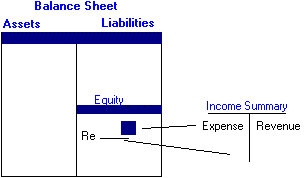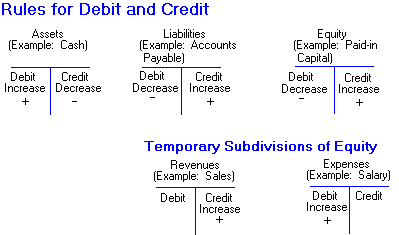Rules for Revenues and Expenses
Changes in accounts must be either increases or decreases. Increases in equity associated with operations during a period are called revenues, and decreases are called expenses. The difference between the revenues of a period and the expenses of a period is the income for the period (also called profit or earnings). If the difference between revenues and expenses is negative, you have a loss.
The accounting system contains an account for each type of revenue--for example, Sales Revenue--and for each type of expense--for example, Salary Expense. The rules for debits and credits to these accounts are the same as those for equity accounts because revenue and expense accounts are subdivisions of equity.

Remember that increases in equity are credit entries. Since revenues increase equity, revenues are credits. Decreases in equity are debit entries. Since expenses decrease equity, expenses are debits. To summarize:
- To record revenues, credit a revenue account.
- To record expenses, debit an expense account.
These two rules, together with the four given earlier, are the complete list of debit and credit rules. (There is one minor exception. It relates to an unusual type of account that is called a contra account and will be explained later.) From here on, we are applying these rules to a variety of transactions. We are not developing new rules. You can record any transaction, no matter how complicated, by using these rules. The word "charge" is often used instead of "debit," especially with reference to expense transactions. For example, "Charge $100 to supplies expense."
The six rules for debit and credit follow:
- To increase an asset account, debit it.
- To decrease an asset account, credit it.
- To increase a liability or equity account, credit it.
- To decrease a liability or equity account, debit it.
- To record revenues, credit a revenue account.
- To record expenses, debit an expense account.
The following diagram may help you remember these rules. It shows the type of accounts, with each type being divided into a left-hand and a right-hand side. Debit entries are always made to the left-hand side of the account. However, debits to asset and expense accounts are increases, while debits to liability and equity accounts are decreases. Credits are the opposite.
